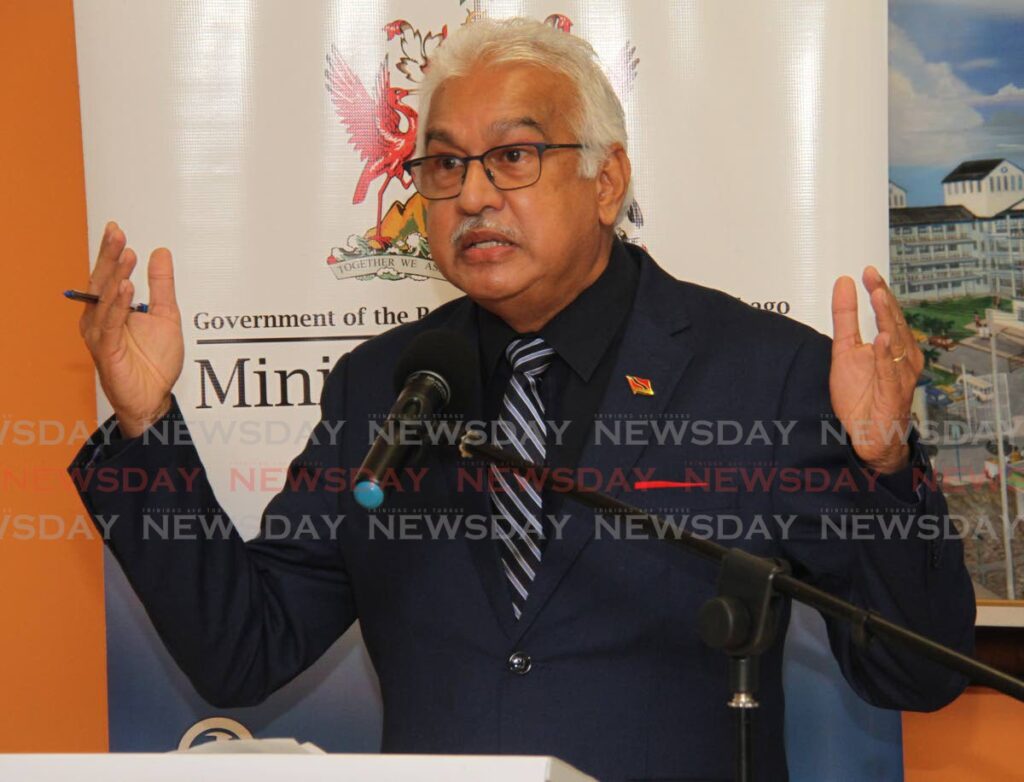Health Minister had swine flu

Health Minister Terrence Deyalsingh is praising the public healthcare system, more so, after battling swine flu. He spoke about plans to increase the country’s blood donation among other things while he addressed attendees at the TT Medical Association’s (TTMA) 28th annual medical research conference.
The conference was held on September 11 at Hyatt Regency Trinidad, Wrightson Road, Port of Spain.
Last week, the minister was hospitalised at the Arima Hospital. Media reports, at the time, said covid19 was ruled out.
At the Sunday morning event, he said, “I did spend some time at Arima Hospital last week, recovering from, not covid19, but swine flu.
“I got Influenza A (H3N2). My only regret in spending my time in a hospital bed is having led the health team to where we can have physical celebrations for our 60th anniversary of Independence, I was not able as the person who led the medical response to be part of those festivities,” he said.
He then spoke about several issues in the healthcare system as well as TT’s response to the pandemic.
Although the conference’s theme focused on the post-pandemic era, Deyalsingh spoke about the country’s pandemic response.
He said nothing prepared the country to respond to the pandemic like the pandemic itself.
He thanked all of TT’s healthcare workers for their work during the pandemic’s height and said, “the entire medical and paramedical team came together as one.”
Deyalsingh said the teams were united in vision and purpose.
He recognised the Prime Minister and Finance Minister Colm Imbert for allocating $200 million to healthcare workers as a token of appreciation and called on the audience to give a round of applause.
He said, “While the covid19 pandemic overwhelmed healthcare systems around the world, by any objective measure, the TT health response and facilities were never overwhelmed. “
This was because, in 2019, he decided to establish a parallel healthcare system.
During that time, while there was increased maternal and infant mortality in other countries, this did not happen in TT.
Deyalsingh said he loved the public healthcare system and would continue to defend it against unnecessary attacks while saying that in a particular first-world country people had to wait approximately 20 hours if they experienced a heart attack or stroke. He did not name the country.
“We never, never – even at the height of covid, when over 50 per cent of our ambulance response was dedicated to covid – had that type of situation.”
Deyalsingh said people needed to be careful about bashing the public healthcare system as it saves lives.
As the country returns to a sense of normalcy, the Ministry of Health established some strategic objectives it hopes to achieve in the next two years, he said.
Those objectives are to continue gains with respect to maternal and infant mortality; improve patient experience, pursue a national health information system, continue to decentralise TT’s mental health care, and improve blood donation.
“Being a patient last week in a public hospital gave me an entirely new perspective where I can come to you and talk about the patient experience as a Minister of Health.”
He said his xperience at Eric Williams Medical Sciences Complex’s (EWMSC) and the accident and emergency department at Arima Hospital was “absolutely first class.”
To make the system more patient-centric and focused, the ministry plans to embrace more pathways to accessing care including digital health. He said the country will be pursuing a national health information system.
“We have to move away from pen and paper.”
The ministry also plans to address long covid.
He said over 4,000 people died from covid19 complications and the data showed many people had diabetes or hypertension as a contributory factor.
The world was suffering from a mental health crisis, not just TT.
This was brought about not only by covid but by geo-political forces. He said TT’s mental health response has to be robust and accessible and that was why the ministry was going full-steam ahead with the decentralisation of mental health care services.
“So people can access mental health care at the primary level and away from the institutional model of a sanatorium or a psychiatric hospital.”
To address TT’s problem of a safe, reliable, and predictable supply of blood the ministry plans to have a public education campaign where it gets about 20,000 people to donate twice or three times per year, he said.
“We only collect about 20,000 pints of blood per annum for use in both the public and private sector and to the unsuspecting man in the street, there is his belief that the private sector collects its blood.”
He said the ministry collects the blood for both and private and public sector and it is processed at the cost of $2,000 per pint.
He said World Health Organisation’s model says the country should be collecting about 60-70,000 pints per year.
Deyalsingh said the country’s immediate objective is to recruit an army of 20,000 people to become “true, voluntary, non-remunerated, altruistic blood donors.”
“If we can do that and each of them donate twice to three times a year, that is 40-60,000 pints per year.”
Deyalsingh described the current model of blood donation as coercive.
“Where patient’s families have to go seeking for blood, begging for blood and buying blood. Those days, hopefully in two to three years, will come to an end.”

Comments
"Health Minister had swine flu"